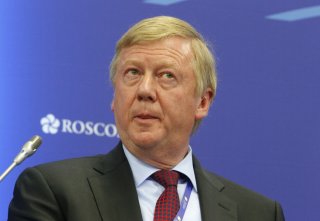Hit Job? Russian Official-Turned-Defector Hospitalized in Europe
In late March, Anatoly Chubais resigned from his position as Russia's global climate envoy and went into exile in Turkey.
Anatoly Chubais, Russia’s former deputy prime minister and one of the country’s most powerful figures during the 1990s, reportedly entered an intensive-care unit within a European hospital on Sunday, according to RFERL.
Ksenia Sobchak, a Russian television personality and a close friend of Chubais’ family, wrote on her Telegram channel that the former Russian official was suffering from Guillain-Barre syndrome, a rare immune condition. She also claimed that he had entered a clinic within Europe, although she did not provide further detail on his whereabouts. The severity of Chubais’ condition remains unknown.
An economist by training, Chubais achieved his most prominent roles in government during the 1990s under President Boris Yeltsin, Russia’s first post-Soviet leader and Vladimir Putin’s predecessor in office. During that time, he oversaw Russia’s privatization of state-run enterprises from the Soviet era. The first period of this transition, often described as “economic shock therapy,” saw the collapse of Russia’s economy and the emergence of a handful of billionaire oligarchs. The deputy prime minister also oversaw a period of modest economic growth from the mid-1990s until a second financial crisis in 1998 led Russia to devalue the ruble and default on its foreign debt, discrediting his liberal reforms in the eyes of many Russians. Although Chubais never again regained his former leadership roles following Putin’s accession to power, he maintained a series of public roles, including as chairman of the publicly-owned Rusnano Group, which seeks to expand Russia’s domestic high-tech industries.
At the time of Russia’s invasion of Ukraine, Chubais served as the country’s global climate envoy. In late March, however, he resigned from his position and went into exile in Turkey. Although the Kremlin has denied a connection between his resignation and its “special military operation” in Ukraine, he is thought to have resigned over personal opposition to the war, making him the highest-ranked member of the Russian government to leave his post over the invasion. That decision may have also made him a target for Russian retribution and, in spite of the official diagnosis, Sobchak observed in her Telegram post that Chubais’ doctors had entered his room in “chemical protection suits,” suggesting that the doctors feared that a toxin had played a role in Chubais’ condition. Although no publicly-available information has so far suggested the Kremlin’s involvement, it has notoriously conducted poisonings against other dissidents—notably including former Russian intelligence agents Alexander Litvinenko, who was killed in 2006, and Sergei Skripal, who was seriously injured in 2018.
Trevor Filseth is a current and foreign affairs writer for the National Interest.
Image: Reuters.

